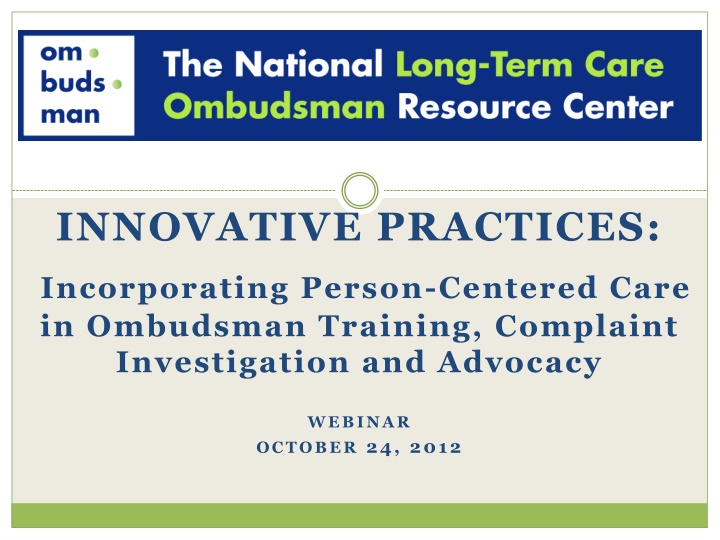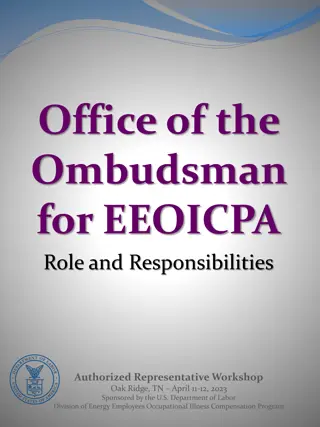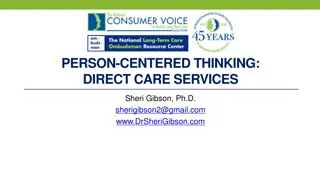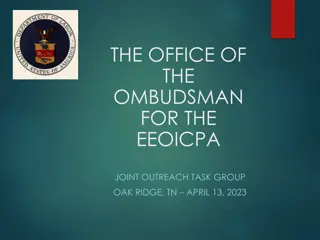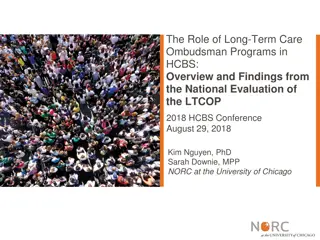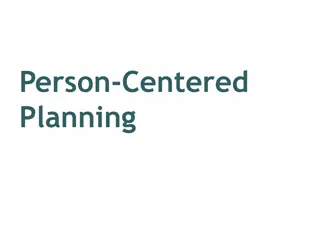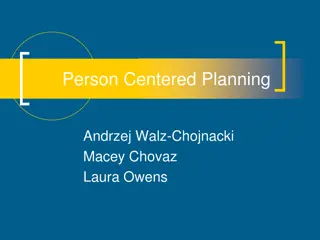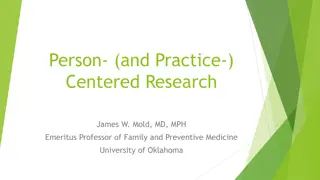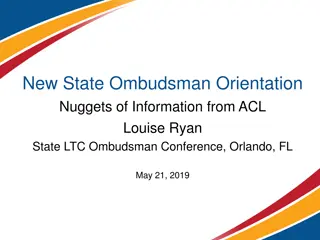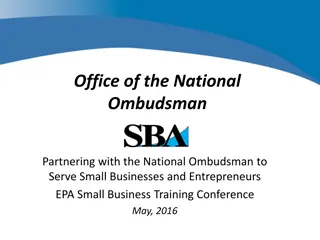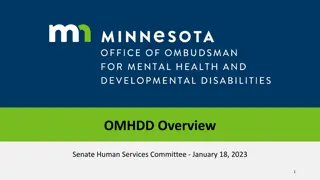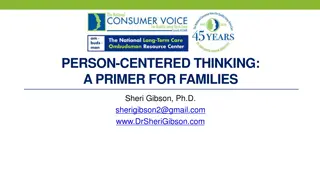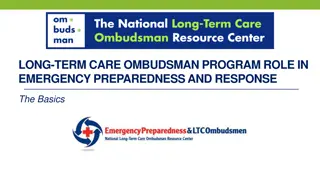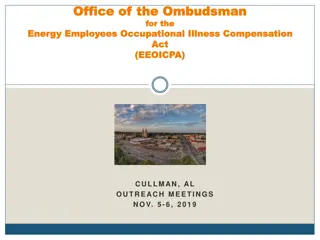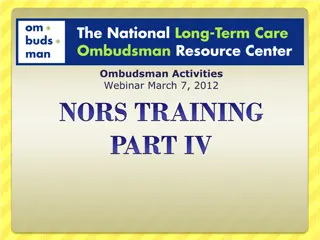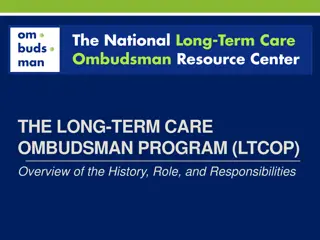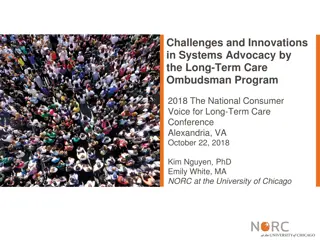Innovative Practices in Ombudsman Training for Person-Centered Care
Incorporating person-centered care principles in ombudsman training is vital for enhancing the quality of long-term care services. This webinar held on October 24, 2012, discussed the application and implementation of innovative practices from state programs to advocate for quality care, resident rights, and culture change in long-term care settings. Ombudsmen play a crucial role in promoting resident-directed care, resolving complaints, and driving systemic advocacy efforts. The webinar also highlighted the importance of individual advocacy, culture change principles, and the Older Americans Act in supporting community efforts for improved long-term care.
Download Presentation

Please find below an Image/Link to download the presentation.
The content on the website is provided AS IS for your information and personal use only. It may not be sold, licensed, or shared on other websites without obtaining consent from the author.If you encounter any issues during the download, it is possible that the publisher has removed the file from their server.
You are allowed to download the files provided on this website for personal or commercial use, subject to the condition that they are used lawfully. All files are the property of their respective owners.
The content on the website is provided AS IS for your information and personal use only. It may not be sold, licensed, or shared on other websites without obtaining consent from the author.
E N D
Presentation Transcript
INNOVATIVE PRACTICES: Incorporating Person-Centered Care in Ombudsman Training, Complaint Investigation and Advocacy WEBINAR OCTOBER 24, 2012
Overview of Webinar Ombudsman Role and Culture Change Applying Person-Centered Care Principles to LTCO Work & Role Innovative Practices from State Programs What Why How Application & Implementation in Your Program Summary & Closing
Overview of Topic Previous Work, Background LTCO Training and Resources on Culture Change practices, since 1995 2011 - 2012: Focused on Person Centered Care, Culture Change Principles Consistent with Ombudsman Role and Practice Application to Individual Advocacy
Ombudsmen, OBRA and Culture Change Culture Change Older Americans Act Support community efforts to improve long-term care Provide information to residents, families and providers regarding culture change and resident-directed care Advocate for quality care and rights of residents at the individual and systemic level Promote resident-directed care and culture change during complaint resolution Resolve problems by representing the interest of the resident Collaborate with others for widespread change and promote culture change as systems advocacy Act on residents behalf in response to action or inaction by providers, public agencies and others that may adversely affect the resident
Ombudsmen, OBRA and Culture Change Culture Change/ Pioneer Principle OBRA Right to the highest practicable physical, mental, and psychosocial well-being of each resident Respond to spirit, as well as mind and body Know each person Right to be treated with consideration, respect and dignity Relationship is the fundamental building block of a transformed culture Right to self-determination and choice All elders are entitled to self- determination wherever they live
Complaints and Culture Change Culture Change Practice Know each person, put the person before the task Build relationships (Guardian Angel Program) Create neighborhoods Involve residents in hiring Involve residents in training Consistent assignment Learning circles Complaint D-26: Dignity, respect- staff attitudes
Overview of Topic 2012 - 2013: Focus on Incorporating Culture Change Principles into Ombudsman Training Complaint Investigation Ongoing Advocacy, Systems Approaches
Application Scenario #1 Brentwood Manor: PCC goal, CC Coalition Hickory Hills: No time for Advancing Excellence or CC Complaints regarding resident participation in care planning in both facilities Respondent: Sherry Culp, Executive Director, Nursing Home Ombudsman Agency of the Bluegrass
Application Scenario #1 1. What do you do? What statements would you make as you work on this issue with the facility and in talking with the resident? 3. In resolving this complaint, do you do anything differently than you do with Brentwood Manor? 4. If so, what and why? If not, why not? 7. How do you ensure that residents and families in both facilities see you as their ally?
Application Scenario #2 LTCO working diligently on CC, encouraging providers to participate in Advancing Excellence Campaign, consumer education CC Coalition gaining momentum LTCO has a leadership role LTCOP has newsletter article about good provider practices, featuring a provider Other activities Respondent: Shannon Gimbel, LTCOP Manager, Denver, Colorado
Application Scenario #2 What is your response to allegations you are focusing on the fun things not on resident advocacy and the tough cases? 1. 3. How do you respond to the allegations regarding a conflict of interest with your LTCO role? Rationale? Evidence?
Application #3 What LTCO actions, statements, or materials, may be interpreted as being pro-provider? 1. 2. What ticklers may prompt you to ask if you are becoming too aligned with providers perspectives in problem resolution?
Application #3 What LTCO actions, statements, or materials, may be interpreted as being pro-provider? Socializing with facility staff outside of the facility, hugging staff Criticizing residents/families Trying to lower a resident s expectations of the facility Participating in work groups with providers, being silent to avoid being viewed as negative Participating in care plan meetings upon staff request without asking the resident Spending more time with staff than with residents Volunteer LTCO becomes resident, then continues as a volunteer in that facility after discharge
Application #3 What ticklers may prompt you to ask if you are becoming too aligned with providers perspectives in problem resolution?
Innovative Ombudsman Practices Selected State Examples Alabama: Karen Guice, Lead Ombudsman, Jefferson County LTCOP Texas Your Program/State
Innovative Practices: Texas Revised LTCO Curriculum to infuse resident direction throughout Includes a chapter on resident direction Why? LTCO practice: what does the resident want? Revised training to include culture change Could do more to infuse giving residents control, option to speak for themselves LTCO step up only when residents signal a need
Innovative Practices: Texas Results? LTCO can help talk the talk and walk the walk , role models for providers The LTCOP confronted issue: Easier to be paternalistic and fix people s problems without them; Better to give residents control Today, staff and volunteers describe their work differently than in the past. More confident that the steps LTCO take are the right ones because they are driven by the person Finding more partners in provider community who share the LTCO views
Innovative Practices: Your Program 1. What you re doing, why, and how including training ombudsmen and the role of the LTCOP? 2. How are person-centered care or culture change principles applied to daily LTCO work?
Application, Implementation: Your Program New ideas or application points that you will use in your work. 1. 2. How will you share the info with other LTCO?
In Closing Seize daily opportunities to incorporate Culture Change principles and encourage resident-directed care in: LTCO training Complaint resolution process Systemic advocacy Program leadership Resource allocation Remain sensitive to potential perceptions of conflict of interest in your role or the LTCO Program s integrity as a resident advocate.
Culture Change: Philosophy and Practice Culture change is a complete change in philosophy and practice creating a resident-directed approach to all aspects of life in long-term care Culture change includes changing how Ombudsmen communicate with residents, families and providers Supporting resident-directed care is important and meaningful at every level including collaboration in coalitions and daily advocacy
Resources The National Long-Term Care Ombudsman Resource Center (NORC) www.ltcombudsman.org The National Consumer Voice for Quality Long-Term Care www.theconsumervoice.org Pioneer Network www.pioneernetwork.net Advancing Excellence in America s Nursing Homes www.nhqualitycampaign.org CMS (Centers for Medicare & Medicaid Services) www.cms.gov CMS: Four Part Series- From Institutionalized to Individualized Care (archived webcasts) http://surveyortraining.cms.hhs.gov Quality Partners of Rhode Island www.riqualitypartners.org PHI National www.phinational.org YOU! Please share your success and activities with NORC.
The National Long-Term Care Ombudsman Resource Center (NORC) www.ltcombudsman.org The National Consumer Voice for Quality Long-Term Care (formerly NCCNHR) http://www.theconsumervoice.org/ This presentation was supported, in part, by a grant from the Administration on Aging, Department of Health and Human Services.
